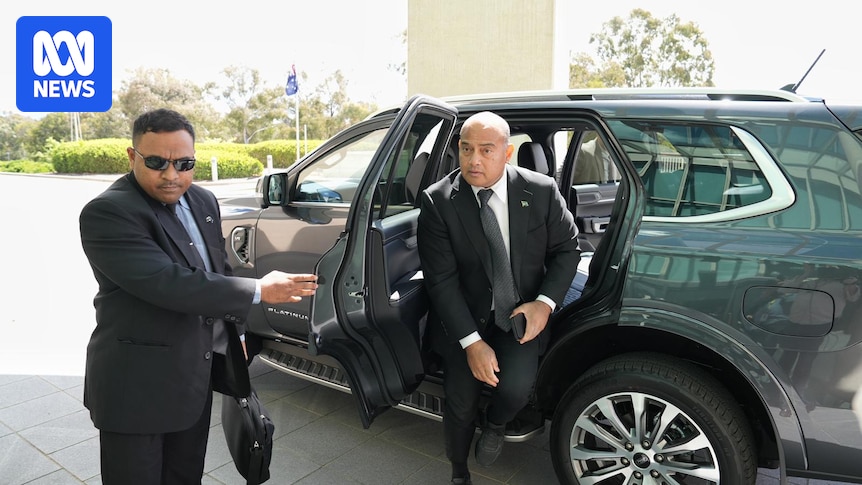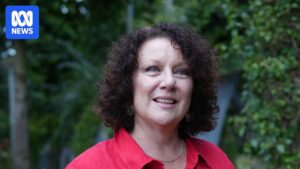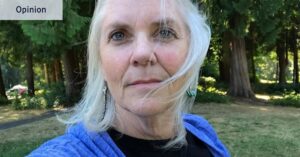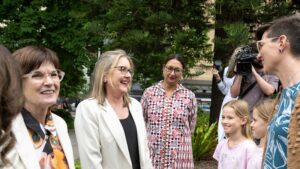
Nauru’s President, David Adeang, made an unexpected and secretive visit to Parliament House in Canberra today, raising eyebrows amid ongoing controversy surrounding Australia’s immigration policies. This visit comes less than two weeks after the first members of the so-called NZYQ cohort were quietly relocated to the Pacific Island nation.
The clandestine trip follows recent reports by Nine newspapers alleging that outlaw motorcycle gangs, specifically the Finks, have secured a lucrative contract to provide security for former immigration detainees on Nauru. President Adeang arrived at the Senate Entrance just before 3 PM, opting not to engage with the media, including the ABC, both upon his arrival and departure half an hour later.
Meetings with Australian Officials
During his brief visit, it is understood that President Adeang met with several key Australian officials, including Home Affairs Minister Tony Burke. A vehicle bearing the Nauruan flag was seen outside the parliament yesterday, suggesting that Adeang also met with Foreign Minister Penny Wong and Pacific Minister Pat Conroy. Additionally, reports indicate he attended a dinner in Canberra the previous night.
This visit has not been publicly announced by either the Australian or Nauruan governments, prompting criticism from various political and civil society groups. The Coalition and the Greens have been particularly vocal, denouncing the government’s dealings with Nauru and the secretive nature of the resettlement agreement for the NZYQ cohort.
Political Reactions and Criticism
Greens Senator Sarah Hanson-Young has called for greater transparency from the government, questioning the secrecy surrounding the high-level visit. “This government does have a growing problem with secrecy, a growing problem with transparency. They seem to be allergic to transparency and openness,” she stated. Hanson-Young further criticized Australia’s approach to handling asylum seekers, describing it as “barbaric” to use Nauru as a “prison island” for deportees.
“Australia has obligations to people who come here seeking safety and protection, [but is] using Nauru as a prison island and thinking we can just pay to dump people there. It’s pretty barbaric.” — Greens Senator Sarah Hanson-Young
Background on the NZYQ Cohort
The controversy stems from the recent deportation of the first member of the NZYQ cohort to Nauru late last month. This marks the beginning of a broader plan to deport hundreds of convicted criminals to the small Pacific island. As part of the agreement, Australia has committed to paying Nauru $408 million upon the arrival of the first deportee, with additional yearly payments of up to $70 million over the next 30 years, contingent on the number of people transferred.
Whistleblowers have alleged that the Finks outlaw motorcycle gang has infiltrated the operation, securing a taxpayer-funded contract to provide security services on Nauru. This revelation has further fueled the debate over the ethical implications of Australia’s immigration policies and its financial dealings with Nauru.
Implications and Future Outlook
The secretive nature of President Adeang’s visit and the allegations of gang involvement in security operations on Nauru have intensified scrutiny on the Australian government’s immigration strategy. Critics argue that the lack of transparency undermines public trust and raises questions about the ethical considerations of outsourcing immigration detention to a foreign nation.
As the situation unfolds, the Australian government faces mounting pressure to clarify its position and provide greater transparency regarding its agreements with Nauru. The implications of these developments could have lasting effects on Australia’s immigration policies and its international reputation.
Moving forward, it remains to be seen how both governments will address these concerns and whether further details of the secretive dealings will come to light. The ongoing debate underscores the complex and often contentious nature of immigration policy in Australia.







